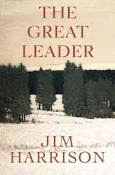 Jim Harrison is a prolific author, probably best known for Legends of the Fall, a 1979 book that
was made into a 1994 movie with Brad Pitt, Julia Ormond, and Anthony Hopkins.
He was once reviewed in this blog, earlier this year – Returning to Earth is a philosophical story about life and death,
not a mystery/thriller. The Great Leader
is a far different tale.
Jim Harrison is a prolific author, probably best known for Legends of the Fall, a 1979 book that
was made into a 1994 movie with Brad Pitt, Julia Ormond, and Anthony Hopkins.
He was once reviewed in this blog, earlier this year – Returning to Earth is a philosophical story about life and death,
not a mystery/thriller. The Great Leader
is a far different tale.
Detective Sunderson has just retired from the Michigan State
Police, and he was recently divorced. Meanwhile, his alcoholism has been
accelerating, and he has to figure out what to do with his life. His first
choice is to pursue the last unresolved/unsolved case in which he was involved,
that of G.L, the Great Leader of variously named cults which were but thin
disguises for stealing the money of his followers and having sex with their
barely pubescent daughters. Meanwhile, Sunderson struggles with his own
sexuality and his attraction to age-inappropriate girls, especially his provocative
16-year-old neighbor Mona. The case takes Sunderson from the Upper Peninsula of
Michigan, to Arizona and New Mexico, back to Michigan, and finally to Nebraska.
The author’s descriptions of the countryside in all of those locations is
wonderful. Harrison used rich and believable characters to support the story
and his protagonist.
Mostly, this is a story of character development, and that’s
what carries the book more than the plot. It is a high compliment when I
suggest that Harrison’s writing is a combination of James Lee Burke, Ken Bruen
and C.J. Box. He captures the struggle of alcoholism like only an alcoholic
would know. I’m very impressed with this book and I’ve already added another
one of his books to my long reading queue.






